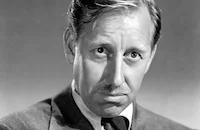Stars and Stripes Forever

Brief Synopsis
Cast & Crew
Henry Koster
Clifton Webb
Debra Paget
Robert Wagner
Ruth Hussey
Finlay Currie
Film Details
Technical Specs

Synopsis
In 1890, noted composer and Marine sergeant major John Philip Sousa, who has been the leader of the famed Marine Corps Band in Washington, D.C. for twelve years, remains frustrated that only his marches, not his ballads, are embraced by the public. Sousa is supported by his adoring wife Jennie and idolized by musicians, including young Marine private Willie Little, who has modified a tuba and named it the "Sousaphone" in his honor. After Willie gets into a fistfight, commander Maj. George Porter Houston allows him to join Sousa's band so that Sousa can keep an eye on him, and Sousa becomes attached to the enthusiastic young man. One evening, Willie persuades Sousa to visit a theater where his ballads are to be sung, but the "theater" turns out to be a vaudeville house in which Willie's girl friend, Lily Becker, is featured as a dancer. When the theater is raided because of the dancers' skimpy costumes, Sousa, Willie and Lily escape to the Sousa home, where Willie convinces Sousa and Jennie to listen to Lily, an aspiring singer, perform. Sousa is bemused by Lily's frenetic style, but encourages her to take singing lessons. Later, Sousa, who has served under five Presidents, introduces his new march, "Semper Fidelis," at a reception hosted by President Benjamin Harrison and his wife, much to Harrison's pleasure. Sousa is given a special award for the song, which is the only composition to have received official recognition from the United States government. Soon after, Sousa informs a disappointed Houston that he will not be re-enlisting in the Marines and intends to form his own band. Houston pleads with Sousa to stay, but the composer is determined, as he has three children to support and has received only $105 in royalties for his marches. At Sousa's request, Willie is released from the Marines and accompanies him to New York, where he holds auditions. Sousa warns the musicians that he will insist on strict military discipline and will not allow wives to accompany them on tour. Willie fibs to Lily, telling her that Sousa wants to audition her for the band, but when she discovers that he has already hired opera singer Estelle Liebling, she is furious. Soon, Sousa has assembled a group of superlative musicians, and their performance at the Chicago's World Fair is a success. As the band tours the world, Sousa earns the nickname "The March King," while back in the U.S., Lily continues to study with the singing teacher he selected for her. One day, Willie and Lily share a passionate kiss, and Lily, disturbed by her "unladylike" response, asks Jennie for advice. Jennie counsels Lily to kiss Willie back, and also informs her that Sousa plans to include her in the band's next tour. Lily is upset, for she had hoped to marry Willie but does not want to break Sousa's rules. Jennie laughingly tells Lily that what Sousa does not know will not hurt him, and soon after, Lily and Willie marry in secret. After the band plays at the Dancing Masters Convention in Atlantic City, Sousa is informed that their upcoming engagement at the Cotton States Exposition in Atlanta has been canceled because marching bands supposedly do not draw big enough crowds. Disgruntled, Sousa shepherds his group onto a train bound for Atlanta, and during the journey, sees Willie sneak into Lily's drawing room. Jennie calms down the outraged Sousa by informing him of their marriage, and Sousa agrees to keep his knowledge secret. Sousa's band is a hit at the exposition, and their happy times continue over the next few years. Sousa often seeks new ways to entertain his audience, and the elaborate numbers he stages around Lily are well-received. One day, however, the band learns that the Maine has been sunk, and Willie re-enlists in the Marines. Sousa also re-enlists, but an attack of typhoid fever prevents him from serving. Sousa recovers and while working on the music for a comic opera, composes a new march, named "The Stars and Stripes Forever," and predicts that it will be his most popular composition. Later, during rehearsals of the show, which features Lily, Jennie receives a letter from Willie, stating that he has been wounded and may lose a leg. Sousa comforts Lily and admits his knowledge of their marriage. After the war's end, groups of wounded men return home, and in Brooklyn, where Willie is hospitalized, Lily escorts him to an evening's entertainment at the recreation hall. Willie is thrilled to see that Sousa's band is to perform and is deeply touched when Sousa calls him to the stand, where his sousaphone is waiting. Willie, who has lost his left leg, joins his comrades on the bandstand, and they play "The Stars and Stripes Forever," which, as Sousa predicted, becomes his greatest hit and inspires generations of Marines.

Director

Henry Koster
Cast

Clifton Webb

Debra Paget

Robert Wagner

Ruth Hussey

Finlay Currie

Roy Roberts
Tom Browne Henry
Casey Adams
Lester Matthews
Maude Prickett
Erno Verebes
Richard Garrick
Romo Vincent
Florence Shirley
Delos Jewkes
Norman Leavitt

Roy Gordon
Helen Van Tuyl
Walter Woolf King

Roger Moore
Thomas E. Jackson
Maude Wallace
Lenee Martin
Sharon Jan Altman
Nicholas Koster
William Vedder
Olan Soule
Aileen Carlyle
Jack Rice

Paul Maxey

Frank Ferguson
Gregg Martell
Jack Ross
Ray Montgomery
Jack Pennick
Jack Mather
Robert Foulk
Max Wagner
Paul Kruger
Wilson Wood
Ruth Clifford
Grazia Narciso
Tito Vuola
Edmond Lucitt
Bill Foster
Ward Ellis
Bill Alcorn
Rene De Haven
Ted Otis
Thomas F. Martin
Luisa Triana
Arthur Brunner
Ernest Brunner
George Riley
Si Jenks
Bobker Ben Ali
John Close
Howard Price

Bill Walker
Joe Ploski
Ralph Brooks
Roy Darmour
Ruth Ann Welsh
Charlotte Hunter
Casse Jaeger
Jack Regas
Jack A. Colton
Gretchen Houser
Susan Scott
Marguerite E. Hogan
Virginia Lee
Jimmy Brooks
George Reeder
Alvin Beam
Robert Street
Joan Morton
Helen Macallister
Patricia Barker
Helen Silver
Frank Miller
Jimmy Thompson
Alice Cavers
Barbara Bailey
Charles Lunard
William Colella
Vida Ann Solomon
Pat Rice
Arun Evans
Pepe De Chazza
Wade Miller
Jon Andrews
Buddy Bryan
Fred Hansen
Mary Jane Hill
Frank A. Dernhammer
Drusilla Davis
Libby Burke
Lisa Lang

George Chakiris
Rudolph Del Campo
Reynolds Johnson
Roy Palmer
Nolie Miller
Jack Fisher
Joan Mckellen
Buddy Robinson
Joan Maloney
Dorinda Clifton
Buddy Martin
Jean N. Harrison
Jack Boyle
Lucille La Marr
Doris L. Fulton
Jack Mattis
Tex Brodus
Crew
Leo Arnaud
Leo Arnaud
Alfred Bruzlin
Jerry Bryan
Claude Carpenter
Nick Castle
James B. Clark
Charles G. Clarke
Ken Darby
Ken Darby
Glenn Delfino
Leonard Doss
Eli Dunn
Daniel Decatur Emmett
Al Fisher
Percy Gaunt
Gaston Glass
Margel Gluck
Roger Heman
R. L. Hough
Julia Ward Howe
Charles H. Hoyt
Dorothy Jeakins
Ray Kellogg
William Knox
Charles Lemaire
Thomas Little
Sgt. Marjorie Moore
Alfred Newman
Alfred Newman
Ben Nye
Lester O'keefe
Jack Pennick
James Sanderson
Willetta Smith
John Philip Sousa
William Steffe
Josef Strauss
Eric Von Stroheim Jr.
Franz Von Suppé
Wesley Trist
Lamar Trotti
Lamar Trotti
Ernest Vadja
Lyle Wheeler
Al White Jr.
Harry Wincott
Joseph C. Wright

Film Details
Technical Specs

Articles
Stars and Stripes Forever
Webb had in recent years become a major box-office draw thanks to the comedy Sitting Pretty (1948), in which he played babysitter Lynn Belvedere. That picture was not only a huge hit but garnered Webb his third Oscar® nomination (and first for Best Actor) and led to two sequels. By 1952, Webb had already appeared in six more films, most of them hits, although his recent Dreamboat (1952) was not. But Stars and Stripes Forever would get him back on track. The musical biography of John Philip Sousa, the "March King," was a commercial success thanks in great part to the eternally rousing Sousa music that fills the soundtrack. And Webb even does sing and dance on screen here a little bit.
Various studios had been attempting to mount a Sousa movie for over a decade. Finally, Twentieth Century Fox studio chief Darryl Zanuck -- after five years of his own negotiations -- succeeded in obtaining the screen rights to the composer's life and autobiography (Marching Along: Recollections of Men, Women and Music, 1928). Zanuck assigned the project to Lamar Trotti to adapt into a screenplay. Trotti was one of the finest writers at Fox (and all of Hollywood), with films like Young Mr. Lincoln (1939), Immortal Sergeant (1943), The Ox-Bow Incident (1943), Wilson (1944), Mother Wore Tights (1947), Cheaper by the Dozen (1950) and I'd Climb the Highest Mountain (1951) to his credit. He had at this point been nominated for two Academy Awards and won one. Trotti's particular gift for capturing Americana was what Zanuck was after here, and while the finished film is better remembered for its musical interludes than for its actual storyline, Trotti delivered the goods. Sadly he did not live to see the final product, dying of a heart attack in August, 1952, four months before the film came out. (Two years later, Fox released There's No Business Like Show Business (1954), with an original story by Trotti, and he was posthumously nominated for a third Oscar®.)
Directing Clifton Webb here for the third time in recent years was Henry Koster, who later said of him, "He had a very strong personality which was almost impossible to penetrate, or to force him to do anything else. I didn't do that. I just tried to impress the sense of the scene to him."
Koster also said that Fox composer Alfred Newman coached Webb on how to conduct, which Webb did colorfully and with large gestures. There was some criticism of this, for the real Sousa had a much more minimal conducting style. "He hardly moved his hands," Koster acknowledged. "People sometimes didn't even see what he was doing when he conducted. But of course that wouldn't have been very spectacular to do in a picture. So I had Clifton Webb conduct with large gestures, and he himself did it. I think he did very well. Only a man who knows music can do that."
A driving theme of the story that is very much true is Sousa's desire to write ballads and waltzes instead of marches. In one memorable scene, Sousa introduces his immortal "Semper Fidelis" as a sentimental ballad, only to have his wife (Ruth Hussey) point out its potential as a march. Otherwise, the story spans Sousa's career starting in 1890, when he has already been leader of the United States Marine Band for twelve years but is increasingly frustrated by the limits of the position. He leaves the Marines, forms his own band and tours the world. Meanwhile, a romance blossoms between a young musician (Robert Wagner) and a singer (Debra Paget) in Sousa's band, and eventually the Spanish-American war throws everything into turmoil and makes Sousa reconsider the Marine Corps.
Stars and Stripes Forever wrapped in the summer of 1952 and was released just before Christmas that year. It not only sold a lot of tickets, it scored with critics: "As spirited as any march John Philip Sousa ever led," said Variety. "Top-notch entertainment. It is alive with Sousa's martial airs, competent performances and an appealing nostalgia... It possibly might not be an accurate Sousa, but it is good Webb as deftly woven by the actor. Ruth Hussey is splendid as Mrs. Sousa." The New York Times declared, "This film is going to thrill those who like band music, even though it may irritate them with its plot... The music is rich and inspiring, thoroughly worthy of the author it extols."
Henry Koster later said that "Zanuck liked it very much. He made a speech once that he didn't want to take any credit for that picture. It was so thrilling, he said, he had to give me the credit. For Zanuck that was unusual."
According to the AFI's notes on this film, the gala premiere for Stars and Stripes Forever featured the actual U.S. Marine Band supplying the music. The event was broadcast in several cities by the ABC television network, apparently a first for any movie premiere.
Henry Koster's own nine-year-old son, Nicolas, plays Sousa's son on screen.
Producer: Lamar Trotti
Director: Henry Koster
Screenplay: Ernest Vajda (story); John Philip Sousa (book); Lamar Trotti
Cinematography: Charles G. Clarke
Art Direction: Lyle Wheeler, Joseph C. Wright
Musical Director: Alfred Newman
Film Editing: James B. Clark
Cast: Clifton Webb (John Philip Sousa), Debra Paget (Lily Becker), Robert Wagner (Willie Little), Ruth Hussey (Jennie Sousa), Finlay Currie (Col. Randolph), Roy Roberts (Maj. George Porter Houston), Tom Browne Henry (David Blakely).
C-90m.
by Jeremy Arnold
SOURCES:
Irene Kahn Atkins, Henry Koster: A Directors Guild of America Oral History
Clifton Webb with David L. Smith, Sitting Pretty: The Life and Times of Clifton Webb

Stars and Stripes Forever
Quotes
Trivia
Notes
The working title of this film was The Life of John Philip Sousa. The film's title card reads: "Twentieth Century-Fox presents John Philip Sousa's Stars and Stripes Forever." The film features intermittent voice-over narration describing Sousa's life. At the film's end, a shot of Clifton Webb as "Sousa" is superimposed over scenes of the then-current Marine Corps Band marching and performing "The Stars and Stripes Forever."
The picture is loosely based on the life of renowned composer and band leader John Philip Sousa (1854-1932), who joined the Marine Corps Band at the age of thirteen and became its leader when he was twenty-six years old. After leading the Marine Corps Band for twelve years, Sousa formed his own band in 1892 and toured extensively and successfully for many years. Although Sousa's popular marches earned him the nickname "The March King," he also wrote ballads and comic operas, as well as a number of books. Studio publicity reported that whenever possible, Sousa's original music scores were used for the picture. According to information in the Twentieth Century-Fox Records of the Legal Department, located at the UCLA Arts-Special Collections Library, producer-writer Lamar Trotti consulted with members of the Sousa family while preparing the film's screenplay. The characters "Lily" and "Willie" were fictional and created for the picture.
In November 1938, a Los Angeles Times news item reported that Warner Bros. was "likely to produce" a picture about Sousa, and according to a March 1940 Hollywood Reporter news item, Universal was among the studios interested in purchasing the rights to Sousa's autobiography. A November 1942 studio press release announced that the film was set to be produced by Kenneth Macgowan, with Harry Goetz serving as associate producer. In September 1943, Hollywood Reporter announced that due to Macgowan's heavy schedule, the picture would instead be produced by William Bacher. Information in studio records indicates that in 1942-1943, Bacher, Ketti Frings, Harry Kronman, Stephen Longstreet and John Twist worked on drafts of the screenplay. It is unlikely that their work was used in the completed picture, however. Although 1950 Daily Variety and New York Times news items reported that independent producers Jerry Wald and Norman Krasna had purchased the rights to Sousa's song "The Stars and Stripes Forever," and would be using it in a film about "a U.S.O. troupe in the South Pacific," that project was not completed.
According to a November 27, 1942 Los Angeles Examiner news item, Alice Faye was set to star in the picture, which was described as "an early romance between the famous bandmaster and a beautiful girl-Alice." In February 1952, Los Angeles Examiner announced that Rory Calhoun and June Haver had been cast in the romantic leads. Although the CBCS includes Benay Venuta in the cast, her role as "Mme. Bernsdorff-Mueller" was cut from the final film. Studio publicity includes Marilyn Russell, Fred U. Brown, William Martinez, Jack Santora and Carli Elinor in the cast, but their appearance in the completed picture has not been confirmed.
In connection with publicity for the film, star Clifton Webb, assisted by several Marines, imprinted his hand-and footprints in cement in the famed Grauman's Chinese Theatre forecourt on December 7, 1952. According to December 1952 Hollywood Reporter news items, the U.S. Marine Band received presidential approval to play at the film's premiere in New York, which marked the first time that the band had played at such an event. The gala's highlights were broadcast in several cities by the ABC network, marking the first time that a premiere had been covered for television, according to Hollywood Reporter. Stars and Stripes Forever was the last picture of Trotti, who died on August 28, 1951. Trotti, who wrote and produced many successful films at Twentieth Century-Fox, had also worked for the PCA Office in the early 1930s.















